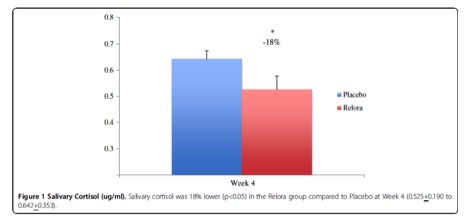
I recently blogged about the Seriphos reformulation: Seriphos has been reformulated – what do I use to lower high cortisol? and promised to share additional products that could provide similar benefits. When someone in my community shared that she uses Relora® with success I started to look at the research and I am very encouraged.
This 2013 study: Effect of Magnolia officinalis and Phellodendron amurense (Relora®) on cortisol and psychological mood state in moderately stressed subjects
assessed salivary cortisol exposure and psychological mood state in 56 subjects (35 men and 21 women) screened for moderate stress and supplemented with a standardized/patented MP [Magnolia bark extract and Phellodendron bark extract] combination (Relora®, Next Pharmaceuticals) or placebo for 4 weeks.
After 4 weeks of supplementation (500 mg /day, with 250 mg at breakfast and 250mg at dinner) these were the results seen in the Relora® group (compared to the placebo group):
- salivary cortisol exposure was significantly lower (18%)
- lower overall stress (11%)
- lower tension (13%)
- less depression (20%)
- less anger (42%)
- less fatigue (31%),
- less confusion (27%)
- and significantly better mood state parameters (11%) and vigor (18%)
Each of the components in Relora® have been shown to be beneficial for controlling stress and anxiety, with the combination proving to be even more effective:
Extracts of Magnolia officinalis bark and its active constituent, honokiol, have been studied in animal models with comparable anxiolytic activity to diazepam (a benzodiazepine anxiolytic used to treat anxiety), but without associated side effects such as sedation.
Berberine, a constituent of the Phellodendron extract, has also demonstrated a significant anxiolytic effect in rodent stress studies.
The combination of magnolia plus phellodendron appears to be even more effective in controlling stress/anxiety compared to either herb used separately.
The study concluded that:
daily supplementation with a combination of Magnolia bark extract and Phellodendron bark extract (Relora®) reduces cortisol exposure and perceived daily stress, while improving a variety of mood state parameters, including lower fatigue and higher vigor.
These results suggest an effective natural approach to modulating the detrimental health effects of chronic stress in moderately stressed adults.
An added bonus is that there were no adverse events or side effects reported.
I’d like to note that the study does report that it was funded by the manufacturer of Relora® (Next Pharmaceuticals) and conducted by SupplementWatch.
A related study, also funded by the manufacturer: Effect of a proprietary Magnolia and Phellodendron extract on stress levels in healthy women: a pilot, double-blind, placebo-controlled clinical trial indicated that
Relora may offer some relief for premenopausal women experiencing mild transitory anxiety.
In this study, the participants used 250mg Relora® 3 times daily for 6 weeks and although mild anxiety was reduced, no changes were observed in cortisol levels. Clearly more research is needed and as with any nutrient, there will be the fact that you may benefit from it and someone else may not.
I’m encouraged enough by the research to begin recommending this product for high cortisol and the anxiety caused by the high cortisol. This will of course be done in conjunction with all the other approaches I use: real whole food, quality animal protein, eat to control blood sugar, no gluten/sugar/caffeine, addressing gut health, using GABA/tryptophan and the other amino acids as needed and addressing low levels of zinc, vitamin B6, vitamin D, iron if necessary. Additional adrenal support would include extra vitamin C and pantothenic acid, a B complex and possibly rhodiola.
Have you used Relora® with success either personally or with clients/patients? Has it lowered salivary cortisol levels? Has it helped with stress and anxiety?
If you had been using Seriphos to help lower high cortisol and reduce stress and anxiety, and decide to use Relora® please let us know how effective it is for you.
Update November 18, 2016: I emailed Interplexus asking if they will be bringing back the original Seriphos formula and received this message from them:
Yes, the information is correct we will be returning the previous formula of Seriphos and are expecting to have it late November, unfortunately we do not have a completion date as of yet so the estimated time frame is not a guarantee. It will be the same formula as before and we will also manufacture a Phosphatidylserine standalone product in the future. If you have further questions or concerns feel free to contact, and you’re also welcome to check on the status of Seriphos periodically.
Update January 20, 2017: Seriphos Original Formula is back and you can read more about it here
